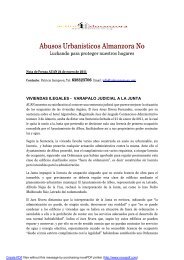European Property Rights and Wrongs - Diana Wallis MEP
European Property Rights and Wrongs - Diana Wallis MEP
European Property Rights and Wrongs - Diana Wallis MEP
You also want an ePaper? Increase the reach of your titles
YUMPU automatically turns print PDFs into web optimized ePapers that Google loves.
para. 85). The Depalles were granted a series of temporary occupation rights,<br />
the last agreement expiring in 1992. In total the house had been in situ for over<br />
a hundred years, for 35 of which the Depalles had occupied as a family <strong>and</strong> by<br />
the time it came to be demolished was worth €1.2M. Renewal was refused once<br />
the Coastal Areas Law 1986 art 25 signalled a tougher approach to coastal ecology<br />
<strong>and</strong> made illegal all private use of coastal l<strong>and</strong>. The house was eventually<br />
demolished without any compensation, <strong>and</strong> on the facts this was held not to be<br />
an infringement of the owner’s right to their property.<br />
Human rights cases often come down to balancing the public interest <strong>and</strong> the<br />
interests of an individual property owner. The harsh decision in Depalle shows without<br />
doubt that coastal conservation <strong>and</strong> the preservation of public access to the<br />
foreshore will be regarded as legitimate objectives of legislation. Demolition pursued<br />
the legitimate aim of promoting unrestricted access to the shore. Pre-eminence will<br />
be given to the community’s general interest in environmental conservation policies,<br />
the state being allowed a wide discretion, or in technical language a ‘margin of appreciation’.<br />
Part of the reasoning of the Strasbourg court was the legitimacy of the<br />
corresponding provisions in other <strong>European</strong> states, including Spain:<br />
‘In Spain, the owners of buildings legally built <strong>and</strong> acquired before the<br />
entry into force of Coastal Areas Law 1988, <strong>and</strong> designed for use as<br />
a dwelling, could obtain a concession of these buildings, without any<br />
obligation to pay a charge on the sole condition that they apply for the<br />
concession within one year of the entry into force of the Law. In Spain<br />
properties built before the Law came into force without a permit or concession<br />
as required by the previous legislation will be demolished if they<br />
cannot be legalised on public-interest grounds. Any building that was<br />
authorised before the Law came into force but is now illegal will be demolished<br />
on the expiry of the concession if it is located on l<strong>and</strong> falling<br />
within the category of maritime public property.’ (extract from para 53).<br />
This case negates any prospect of the widespread use of human rights arguments<br />
against decisions to order the demolition of illegal coastal property. Nevertheless<br />
a few chinks of light emerge where cases may be arguable. 1) The reasoning of<br />
the case relies heavily on the French law principle that public l<strong>and</strong> is inalienable<br />
<strong>and</strong> so title to any encroachment is void. The same would not necessarily apply<br />
to other systems where title to public l<strong>and</strong> was h<strong>and</strong>led differently; in Spain l<strong>and</strong><br />
54<br />
A <strong>European</strong> L<strong>and</strong> Law?



